VHDL Programming with Intel Quartus Prime Tool
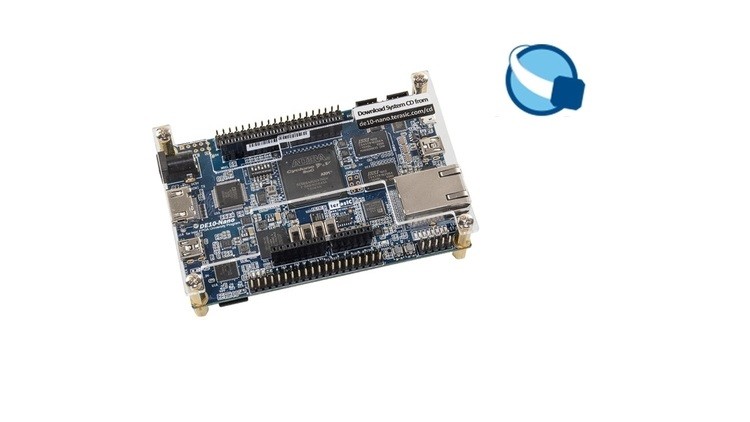
Why take this course?
🚀 Course Title: VHDL Programming with Intel Quartus Prime Tool
🔥 Headline: Unlock the Secrets of VHDL Programming – Beginner to Intermediate Mastery with Intel Quartus Prime!
🎉 Introduction: Embark on a comprehensive journey into the world of VHDL programming, tailored for beginners and perfect for those looking to elevate their skills to an intermediate level. This course is your gateway to mastering the VHDL language and harnessing the capabilities of Intel Quartus Prime tool for FPGA design. Get ready to build your knowledge from the ground up, with practical examples and hands-on lab sessions that will turn theoretical concepts into tangible skills.
📚 What You'll Learn:
-
Fundamentals of VHDL: Understand the basics of the VHDL programming language, including its syntax and semantics. Learn how to structure your code effectively with our clear explanations and engaging examples.
-
VHDL Constructs: Dive deep into the world of conditional statements, process statements, and more. Each concept is presented with clarity and accompanied by practical project work using the Intel Quartus Prime tool.
-
Real-World Application: Engage in lab sessions where you will design combinatorial circuits, sequential circuits, and state machines, applying your newfound VHDL skills to real-world scenarios.
-
Testing Your Code: Learn how to write testbench modules and simulate your designs using Modelsim. This is crucial for debugging and verifying your VHDL code, ensuring it behaves as intended.
-
Advanced Simulation Techniques: Explore the use of Vector Waveform Generator for advanced simulation and verification techniques with practical examples to solidify your understanding.
-
Structural Design Methodology: Discover the structural design methodology by designing a "Full Adder" using a combination of "Half Adders". This approach will help you understand how to build complex designs from simpler components.
🧪 Course Highlights:
- Hands-on projects with Intel Quartus Prime tool for practical learning.
- Comprehensive lab sessions on combinatorial, sequential circuit design, and state machines.
- Step-by-step guidance on writing testbench modules and simulating designs with Modelsim.
- In-depth coverage of structural design methodology with real-world examples.
- Access to a Vector Waveform Generator for advanced simulation and verification techniques.
🎓 Who Is This Course For? This course is designed for:
- Beginners who are new to VHDL programming and looking for a structured learning path.
- Intermediate learners seeking to refine their skills in VHDL design with practical applications.
- Engineers, developers, or students interested in FPGA technology and its applications.
- Professionals aiming to enhance their embedded systems knowledge with VHDL programming.
📅 Key Takeaways: By the end of this course, you will have a solid understanding of VHDL programming principles, practical experience using Intel Quartus Prime for FPGA design, and the skills needed to design, test, and verify complex digital systems. You'll be well-equipped to tackle real-world problems with confidence and precision.
👩🏫 Instructor Profile: Led by experienced industry professionals, this course is designed to provide you with the knowledge and hands-on experience needed to succeed in the field of digital design. Our instructors are experts in VHDL programming and FPGA technology, ensuring that you receive top-notch, industry-relevant training.
🛠️ Tools Used:
- Intel Quartus Prime Tool
- Modelsim Simulation Software
- Vector Waveform Generator for simulation and verification
👉 Enroll Now to secure your spot in this transformative course and take the first step towards mastering VHDL programming with Intel Quartus Prime! 👈
Note: This course is a comprehensive journey into the world of VHDL programming, designed for those who wish to learn from scratch or enhance their intermediate-level knowledge. With hands-on projects, lab sessions, and real-world applications, you'll be equipped with the skills necessary to excel in FPGA design and digital systems development.
Course Gallery
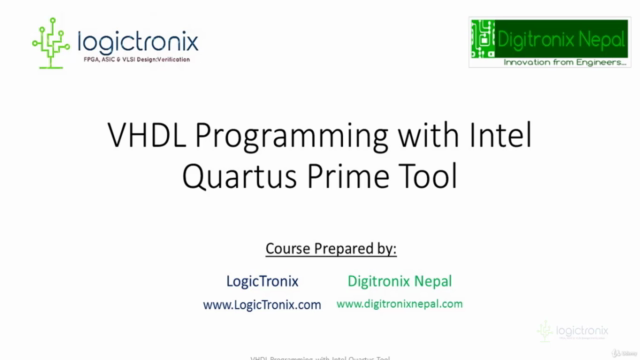
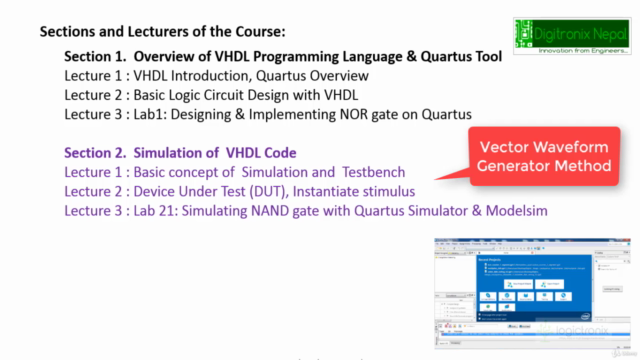
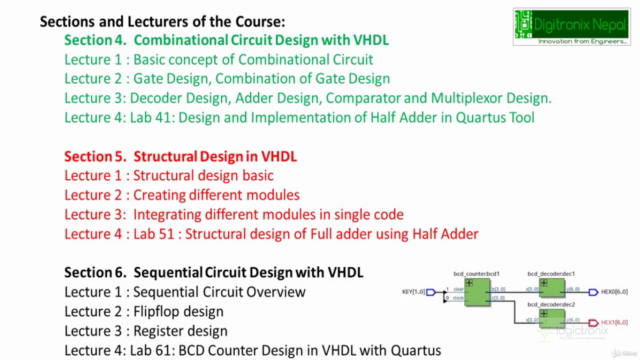
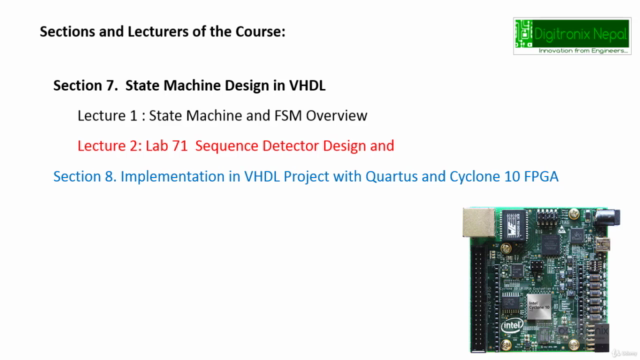
Loading charts...